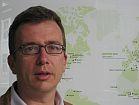Ideas with after-effects
 Project manager Enzio Wetzel on “Close-Ups” and expectations for the exchange programme.
Project manager Enzio Wetzel on “Close-Ups” and expectations for the exchange programme.
What’s behind the project "Close-Up"?
It is a new exchange programme by the Goethe-Institut for journalists. Editorial journalists from Germany exchange workplaces with journalists from Islamic countries for four weeks and write articles for the local sections of their host newspapers. For example, a reporter from the Süddeutsche Zeitung is going to Côte d'Ivoire, and in exchange a colleague from Abidjan is coming to Munich. At the moment, six newspapers are involved in the project; three from Germany and three from Africa and the Middle East - from Nigeria, Lebanon and Cote d'Ivoire.
What do you expect from such an exchange?
The unfiltered observations of the journalists can reveal not only differences, but also commonalities and these commonalities are what it’s all about. The journalists will observe, ask questions, notice the everyday and exciting occurrences in their surroundings and report on them – on what a reporter for the local section, for "his" readers, finds interesting. So, it’s not so much about analyses, like those that appear in the political section of a newspaper, but about a close-up.
Yet, isn’t it the unobstructed view in particular that often causes misunderstandings, especially when there are language barriers, too?
Not necessarily. The journalists are involved in the editorial offices and are able to talk with their local colleagues. The majority of journalists speak the language of the respective host country and in addition English can be used as a bridging language in the offices. If needed, the Goethe-Institut is also providing interpreters. The language problem can certainly not be solved altogether, but it is perhaps less relevant when one is able to be unbiased and attentive.
What language will the guest journalists write in?
In their own language. The texts will then be translated into the respective national language.
Will every article the guest author writes be printed?
The editorial offices will decide about publication and their criterion will be a journalistic one: does the guest writer’s article provide the readers with interesting insights? In addition, the home offices of the journalists will also print one or the other article in their papers.
If the guest journalists’ observations uncover and they write about something critical, it may well be that the article does not get into the paper. We expect that more from the Arabic than the western world; that uncomfortable subjects are not publicized.
The journalists will be raising subjects that are expressly local in nature, they will use everyday life as their subject matter; there should not be any political "big problems." The decision about what will be published will ultimately be made by the hosts, the newspapers. The project is being funded by the German Foreign Office task force for dialogue with Islamic countries, which found this possibility to write "very normal" articles for the local section of the newspapers from a supposedly so different world made good sense. All of the articles will, however, be published on the multi-language website of the Goethe-Institut.
Was there a specific catalyst for this kind of project?
The idea originated from experiences we had in the field of literature. A while ago, we invited German writers to come to Cairo as artists-in-residence and we discovered that it is appealing when authors can look at a city they are not familiar with and report about their experiences. Journalists have a different view of things. They focus in a fixed daily or weekly rhythm on important, interesting or entertaining topics from their sphere of work. The journalists’ exchange programme is an experiment. We are curious how it will turn out and how we will continue it.
It looks like you already have some ideas?
We are bringing professionals from journalism together with the Close-Up project. We’re planning to intensify similar professional encounters for other fields of public and cultural life. In the field of Culture and Development we not only promote exchange and learning from one another, but also the actual production; the act of working together.
What does that mean: "working together"?
By bringing together professionals from media and cultural institutions of Germany and from the host countries and allowing them to work and act in their own occupational environment, we hope that the project will generate productive working contacts, which will be effective beyond the actual stay in Germany and the host countries. The people involved in Close-Up are hoping the same thing.
Published in Frankfurter Rundschau on 20 October 2008.








